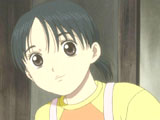

Quick Links:
Koi Kaze, Volume 1: The Reunion
There comes a time in every boy's life where one, and only one thing begins to come to mind: his attractive sister. Or perhaps not. Very few shows have a moral controversy that surrounds them like Koi Kaze. Even fewer can carry such conflict with grace and even a sense of humor. From the first four episodes, Koi Kaze carries its story with a surprising level of maturity, along with a pleasant, tongue-in-cheek wit.
As one might expect, the "16 and up" rating on the box is rather appropriate. Strip that away the topics that make the show so taboo, though, and what is left is a simple, refreshing tale of romance with a biting sense of humor. The series revolves around twenty-seven year old Koshiro. Koshiro, unlike most anime protagonists, is the everyman: resigned to life, and just another body to fill his spot in the job market. As one may expect, he has recently hit some rotten luck: in this case, Koshiro's girlfriend left him for another man. The story continues to play out as one would expect through the first episode: Koshiro meets Nanoka by chance, which leads to an inevitable date and the stark realization of the situation the two are in.
The story may not seem like anything out of the ordinary, but the characters manage to sell the situation well. After the first episode, Koshiro and Nanoka begin to adjust to their new living arrangements, with amusing results. Nanoka tries to fall into the "little sister" role, and begins to fawn over her estranged brother like an adoring sister would. Koshiro, on the other hand, is still tense about the whole situation. He dwells on his breakup, and the fact that he cried in front of his sister. As a result, an odd tension between the two begins to form along with a sense of confusion and dread. This never lasts for too long, though, since an often-humorous side story tends to crop up in every episode. These interludes are often courtesy of Koshiro's coworkers, or Nanoka's classmates, and inject much-needed wit and whimsy into what would be an otherwise overbearing barrage of emotional strife.
To accompany the drama onscreen, the musical team of Makoto Yoshimori and Masanori Takumi have composed a soundtrack that is ideal for all situations. Much of the background tunes are rather subdued, and rely solely on the hauntingly sweet plinking of a piano, or heavy, soulful strings. When the mood calls for it, though, the soundtrack switches to a lighter, more playful tone. The opening theme, "Koi Kaze," is a sweet, melodic song by ef that is quiet, yet hopeful at the same time. The closer, "Futari Dakara" is more melancholy, with slower pace, and heavy emphasis on the piano. The Japanese cast delivers a stellar performance, and includes several veteran actors that include Kousuke Okano (Saint Tail, Flame of Recca), Kenta Miyake (Naruto, Tenjou Tenge), and Akemi Okamura (Tsukikage Ran, One Piece). The English actors' performance is stellar, and captures the tone of the series well. On a technical level, both the English and Japanese tracks are solid, with no audible dropouts or distortion.
Since Koi Kaze is a fairly recent series, it benefits from a decent transfer to DVD. The disc shows no obvious signs of common visual problems, such as cross-coloration or aliasing. The character designs used for the series are of a softer, more realistic variety. Characters tend to shy away from the fantastic in exchange for the everyday norm in most regards. Animation is a slick blend that mainly relies on two-directional movement. CG is all but absent through the show, as its use proves to be quite subtle.
For this release, Geneon opted for a bare-bones presentation. The disc's cover uses the Japanese release's artwork, which is a gorgeous, hand-drawn image of Nanoka. The back of the packaging a brief summary, an episode list, and a brief listing of the disc's contents, accompanied by a collage of shots from the series. The disc's menus are comprised of the menu items, which are set to a tasteful mix of screens and artwork. The sole extra on the disc is the series opening in creditless and original Japanese forms.
The first four episodes of Koi Kaze have created an excellent foundation for what could be a truly great slice of life drama. Hopefully, the series will take advantage of its foundation, and expand into a show that does not disappoint.
Distributor: Geneon Entertainment Creator: Motoi Yoshida/Kodansha Released: 2005
Video Quality: A- Audio Quality: A Presentation: A- Content: A Overall: A



